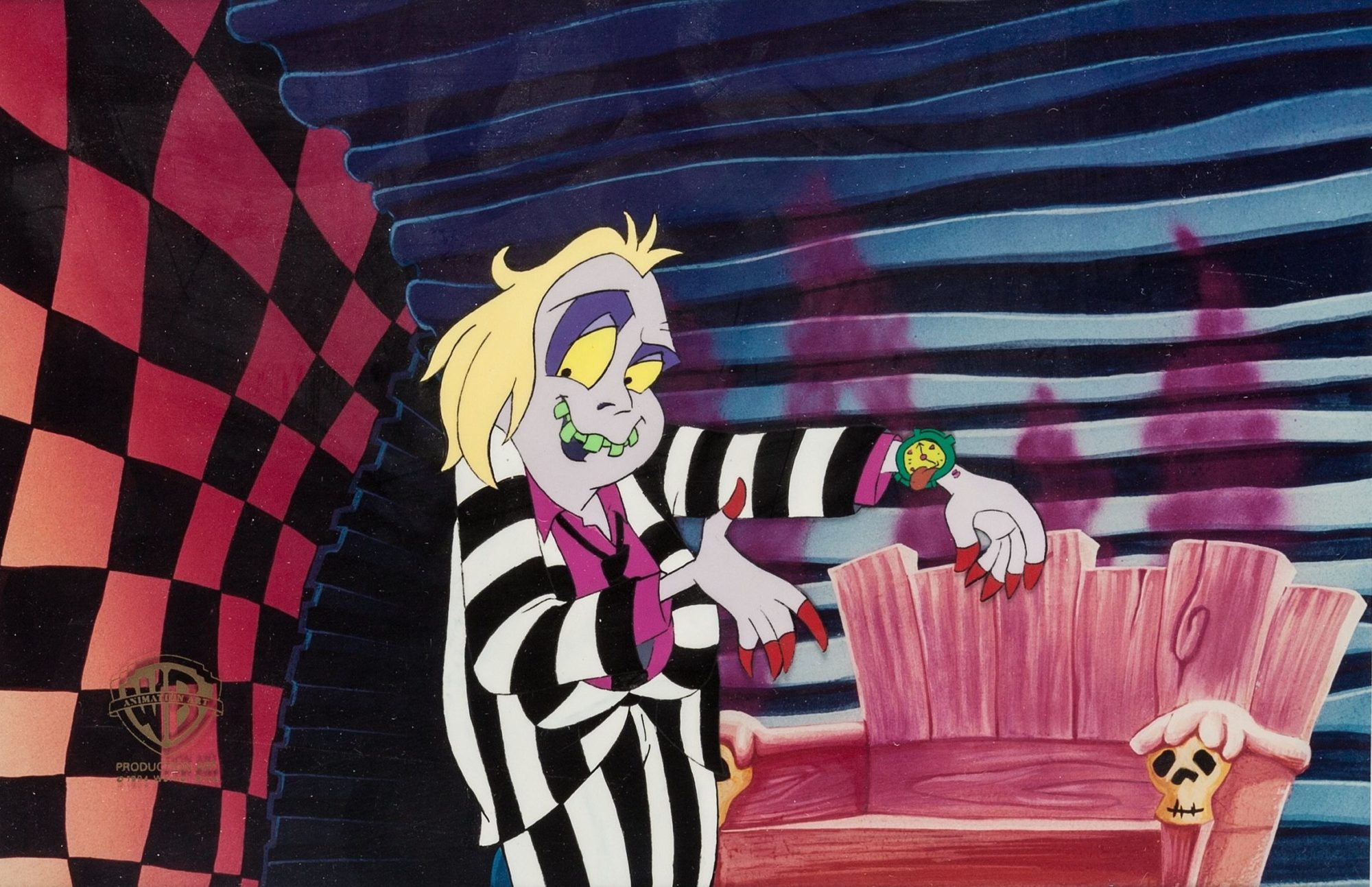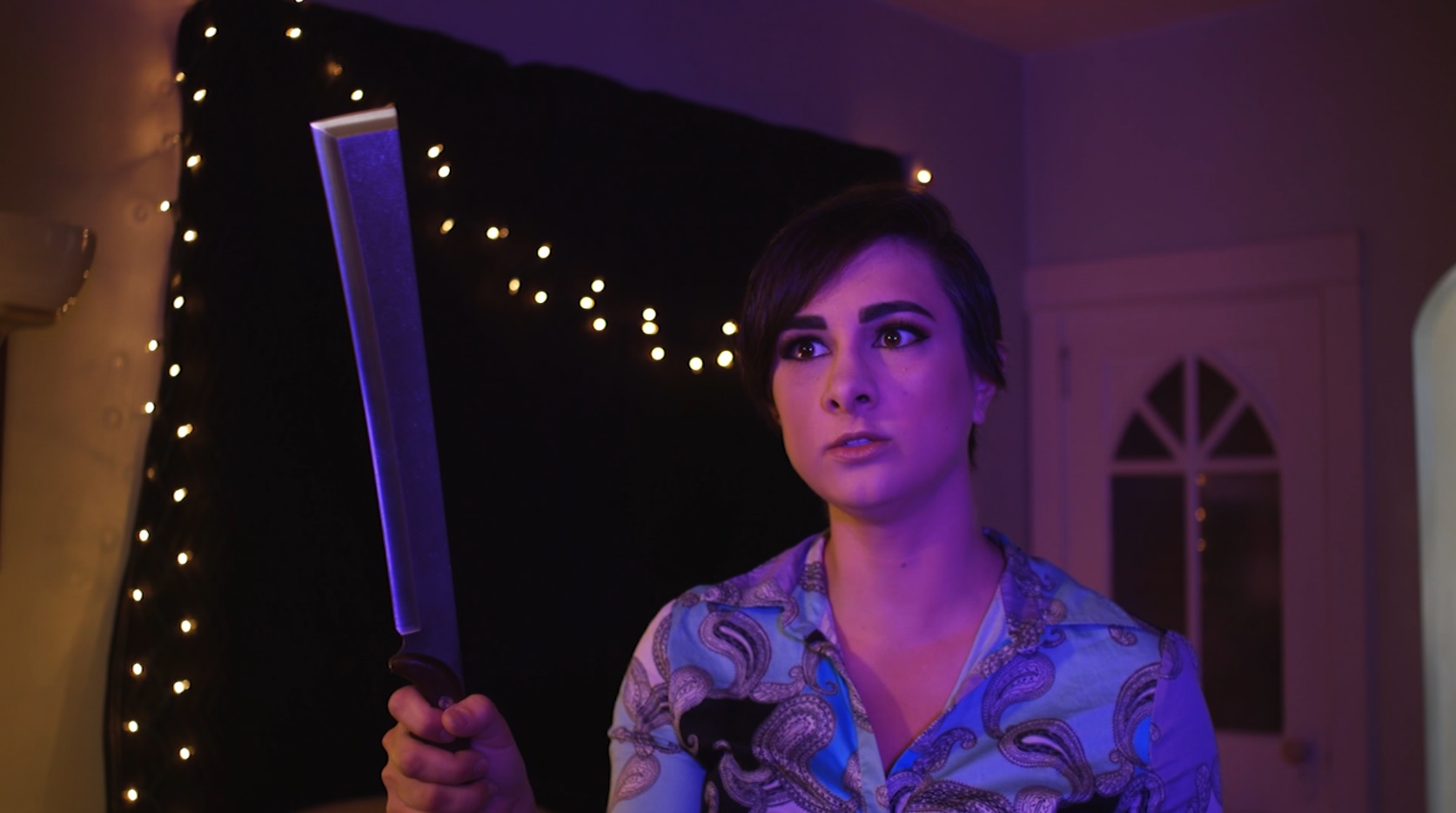Editorials
“Beetlejuice” – Remembering the Animated Series That Came in the Wake of Tim Burton’s Movie

For this month’s installment of “TV Terrors” we revisit the animated series adaptation of Tim Burton’s “Beetlejuice,“ which aired from 1989 to 1991 on ABC/FOX Network.
In the eighties and nineties, studios were never shy about taking mature intellectual properties and cashing in on them by giving them their own animated spinoffs for kids. Among the rather extensive list were direct G-rated adaptations like “Rambo,” “Conan,” “Ace Ventura,” and even “Police Academy.” One of the most notable, and more widely celebrated adaptations was of Tim Burton’s 1988 hit film Beetlejuice. While the original movie excelled in being as menacing, bizarre, and raunchy as possible, executive producers Tim Burton and David Geffen opted for a more kid friendly variation of the “Ghost with the Most” for the animated series.
Aimed more for the 8-12 Saturday morning cartoon demographic, the animated show thankfully stuck true to much of what made the movie so entertaining. Taking off directly from the movie, “Beetlejuice” centered on Goth teen Lydia Deetz, whose adolescence is spent trying to fit into her weird town. She’s also friends with the mischievous ghost Beetlejuice, who appears often to either get into trouble with her in the real world, or take her into his own Neitherworld (no longer the Afterlife) where they inevitably find danger together.
The “Beetlejuice” animated series was a shockingly faithful spinoff from the original blockbuster, channeling the Gothic aesthetic and sinister supernatural themes, but toning them down for younger audiences. Today it feels like a precursor to the Klasky-Csupo animation era, which has helped it aged wonderfully despite being released at the very beginning of the 1990s. Along with maintaining its darker more horror oriented atmosphere, it also included a truncated, re-arranged version of Danny Elfman’s title theme song, and featured many of the characters from the movie (sans Barbara and Adam), often repurposed into less sinister variations.
Lydia Deetz (voiced by Alyson Court) was no longer the death obsessed teenage foil to Beetlejuice, but more of an affable Gothic tween with an adventurous streak. Her parents Charles and Delia Deetz (Roger Dunn and Elizabeth Hanna) were less opportunistic personalities and became more attentive albeit wacky parents to Lydia. They now lived in the small town of Peaceful Pines, in a new house which allowed Beetlejuice new stomping grounds. And the titular Beetlejuice (memorably voiced by Stephen Ouimette) changed a bit from the menacing, foul mouthed, raunchy rival to Lydia we knew from the movie, transformed for the animated series into a more likable, comedic, and playful entity who was a loyal friend to her.
In each episode, the duo would either fend off the villain of the week, or Lydia would spend her time chasing after Beetlejuice to make sure he didn’t get himself into massive trouble. They, of course, were always careful to avoid the dreaded sand worms. What I always found peculiar was that the animated Beetlejuice character felt less like a take on Michael Keaton’s iconic portrayal, and more like mid-eighties Bobcat Goldthwaite, if he had played Beetlejuice. Beetlejuice was also retconned in that he had an almost limitless supply of super powers which allowed him to do pretty much anything, including breaking the fourth wall quite often.
Although Lydia was a lot more light hearted and heroic, she was still a Goth down to her core, and the series thankfully never shed her original concept for the sake of the target audience—save for making her a bit younger. While the whole tonal change might have been a big shift from Burton’s original intentions for his character, “Beetlejuice” worked very well. It not only carried Burton’s vision for this weird world, but also felt very much like a product of Burton’s mind.

The series also expanded on Beetlejuice’s universe by introducing more villains, many more monsters (along with the dreaded sandworms), and more rivals to the pair of protagonists. There was the skeleton best friend Jacques LaLean (a spoof of Jack LaLaine) who had the tendency to go to pieces; Beetlejuice’s neighbor The Monster Across the Street, a hairy, Cowboy-like monster with a vicious dog named Poopsie; Beetlejuice’s enemies Fuzzo and Scuzzo the Clown; Ginger the tap dancing Spider; and Barry MeNot.
Barry MeNot was a computer animated spokesman for NTV (Neitherworld Television) who pitched weird products for Beetlejuice and the audience; he was intended mainly as a fun series of side gags. There is also a recurring appearance from the small headed ghost from the movie, now named I.M. Smallhead. Most Burtonesque of them all is Prince Vince, the ruler of Neitherworld who is an obvious callback to Burton’s short film “Vincent.”
The series altogether aired for four seasons with ninety four episodes total, and over a hundred segments. It was so popular, in fact, that it set a precedent. The high demand prompted the ABC Network to sell episodes of the series to FOX, resulting in the show running on competing networks for many years. All things told, along with the four seasons, there was a mountain of merchandise for “Beetlejuice” including an action figure line, video games, books, sticker albums, the whole nine yards. Even after the series ended, it flourished in syndication.
The animated series indicated that “Beetlejuice” wasn’t just a one off Tim Burton success and helped to support the fans’ demands for a sequel for many, many years. On its own it’s still a wonderful animated series that clicks beautifully into the Tim Burton universe, and might even work as pitch perfect gateway horror for kids of today.
Is It Available? After years of being out of print, the series was eventually re-released by Shout! Factory in 2013 on DVD. It’s still available, but the series is not streaming at the moment.


Editorials
Silly, Self-Aware ‘Amityville Christmas Vacation’ Is a Welcome Change of Pace [The Amityville IP]

Twice a month Joe Lipsett will dissect a new Amityville Horror film to explore how the “franchise” has evolved in increasingly ludicrous directions. This is “The Amityville IP.”
After a number of bloated runtimes and technically inept entries, it’s something of a relief to watch Amityville Christmas Vacation (2022). The 55-minute film doesn’t even try to hit feature length, which is a wise decision for a film with a slight, but enjoyable premise.
The amusingly self-aware comedy is written and directed by Steve Rudzinski, who also stars as protagonist Wally Griswold. The premise is simple: a newspaper article celebrating the hero cop catches the attention of B’n’B owner Samantha (Marci Leigh), who lures Wally to Amityville under the false claim that he’s won a free Christmas stay.
Naturally it turns out that the house is haunted by a vengeful ghost named Jessica D’Angelo (Aleen Isley), but instead of murdering him like the other guests, Jessica winds up falling in love with him.

Several other recent Amityville films, including Amityville Cop and Amityville in Space, have leaned into comedy, albeit to varying degrees of success. Amityville Christmas Vacation is arguably the most successful because, despite its hit/miss joke ratio, at least the film acknowledges its inherent silliness and never takes itself seriously.
In this capacity, the film is more comedy than horror (the closest comparison is probably Amityville Vibrator, which blended hard-core erotica with references to other titles in the “series”). The jokes here are enjoyably varied: Wally glibly acknowledges his racism and excessive use of force in a way that reflects the real world culture shift around criticisms of police work; the last names of the lovers, as well the title of the film, are obvious homages to the National Lampoon’s holiday film; and the narrative embodies the usual festive tropes of Hallmark and Lifetime Christmas movies.
This self-awareness buys the film a certain amount of goodwill, which is vital considering Rudzinski’s clear budgetary limitations. Jessica’s ghost make-up is pretty basic, the action is practically non-existent, and the whole film essentially takes place in a single location. These elements are forgivable, though audiences whose funny bone isn’t tickled will find the basic narrative, low stakes, and amateur acting too glaring to overlook. It must be acknowledged that in spite of its brief runtime, there’s still an undeniable feeling of padding in certain dialogue exchanges and sequences.

Despite this, there’s plenty to like about Amityville Christmas Vacation.
Rudzinski is the clear stand-out here. Wally is a goof: he’s incredibly slow on the uptake and obsessed with his cat Whiskers. The early portions of the film lean on Wally’s inherent likeability and Rudzinski shares an easy charm with co-star Isley, although her performance is a bit more one-note (Jessica is mostly confused by the idiot who has wandered into her midst).
Falling somewhere in the middle are Ben Dietels as Rick (Ben Dietels), Wally’s pathetic co-worker who has invented a family to spend the holidays with, and Zelda (Autumn Ivy), the supernatural case worker that Jessica Zooms with for advice on how to negotiate her newfound situation.
The other actors are less successful, particularly Garrett Hunter as ghost hunter Creighton Spool (Scott Lewis), as well as Samantha, the home owner. Leigh, in particular, barely makes an impression and there’s absolutely no bite in her jealous threats in the last act.
Like most comedies, audience mileage will vary depending on their tolerance for low-brow jokes. If the idea of Wally chastising and giving himself a pep talk out loud in front of Jessica isn’t funny, Amityville Christmas Vacation likely isn’t for you. As it stands, the film’s success rate is approximately 50/50: for every amusing joke, there’s another one that misses the mark.
Despite this – or perhaps because of the film’s proximity to the recent glut of terrible entries – Amityville Christmas Vacation is a welcome breath of fresh air. It’s not a great film, but it is often amusing and silly. There’s something to be said for keeping things simple and executing them reasonably well.
That’s a lesson that other indie Amityville filmmakers could stand to learn.


The Amityville IP Awards go to…
- Recurring Gag: The film mines plenty of jokes from characters saying the quiet part (out) loud, including Samantha’s delivery of “They’re always the people I hate” when Wally asks how he won a contest he didn’t enter.
- Holiday Horror: There’s a brief reference that Jessica died in an “icicle accident,” which plays like a perfect blend between a horror film and a Hallmark film.
- Best Line: After Jessica jokes about Wally’s love of all things cats to Zelda, calling him the “cat’s meow,” the case worker’s deadpan delivery of “Yeah, that sounds like an inside joke” is delightful.
- Christmas Wish: In case you were wondering, yes, Santa Claus (Joshua Antoon) does show up for the film’s final joke, though it’s arguably not great.
- Chainsaw Award: This film won Fangoria’s ‘Best Amityville’ Chainsaw award in 2023, which makes sense given how unique it is compared to many other titles released in 2022. This also means that the film is probably the best entry we’ll discuss for some time, so…yay?
- ICYMI: This editorial series was recently included in a profile in the The New York Times, another sign that the Amityville “franchise” will never truly die.
Next time: we’re hitting the holidays in the wrong order with a look at November 2022’s Amityville Thanksgiving, which hails from the same creative team as Amityville Karen <gulp>













You must be logged in to post a comment.